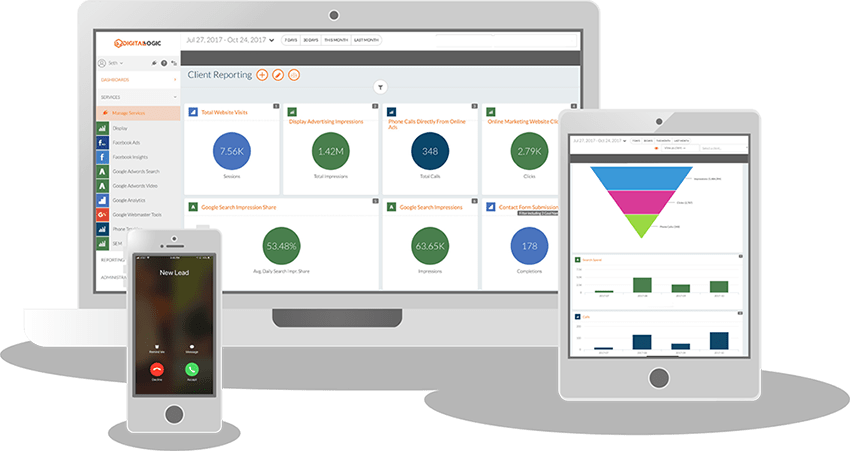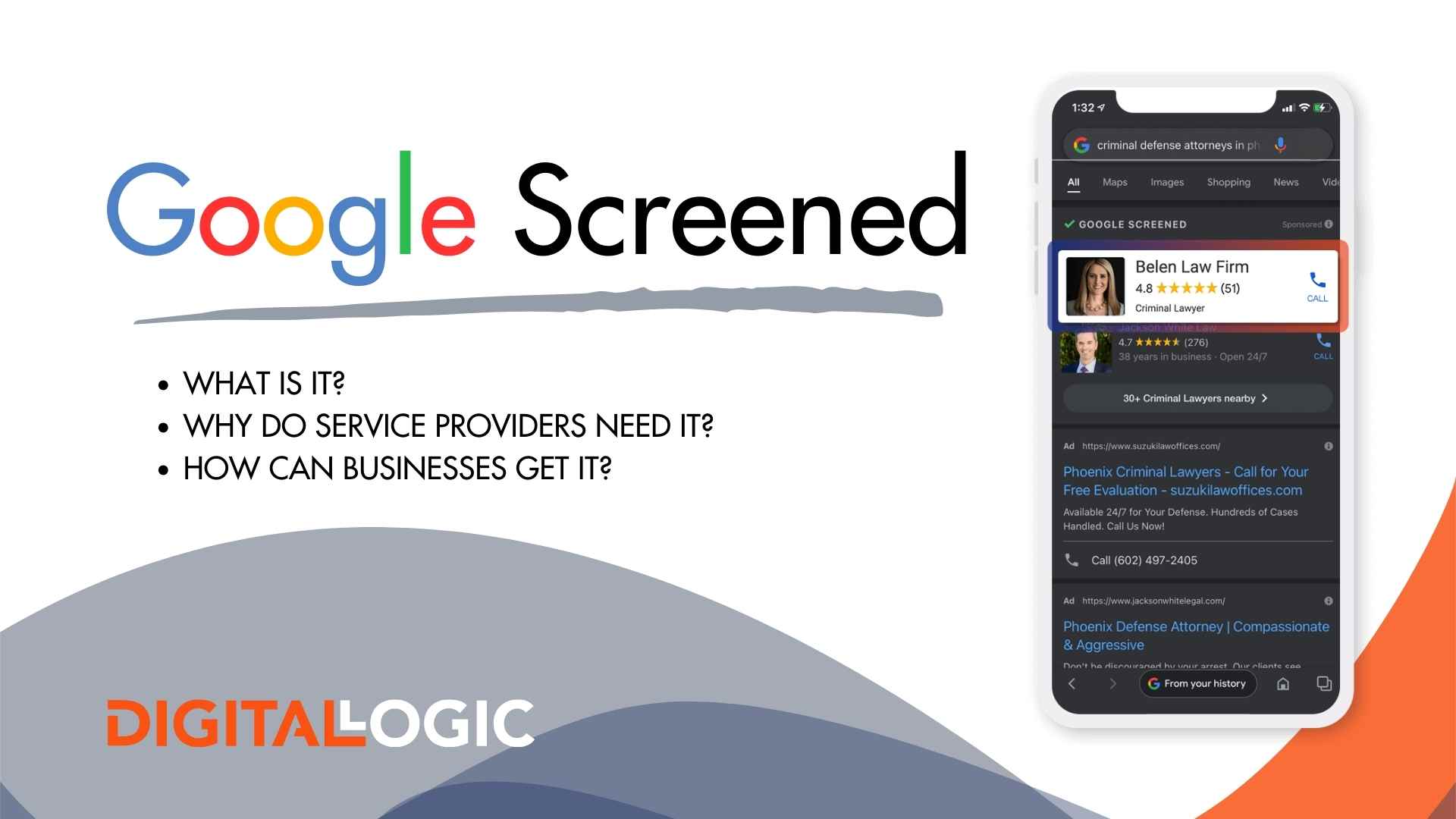Lead generation can be a great way for lawyers to market themselves and acquire new clients.
This guide gives helpful tips on the best practices regarding lead generation for attorneys and advertising ideas for lawyers. From direct lead recommendations to third-party generators, we have compiled the necessary information for lawyers looking to take the next step forward.
Develop a Target Client Profile
Table of Contents
ToggleThe best legal marketing and lead generation practices start with knowing as much as possible about your target clients. The more demographic research you can complete during the planning stage, the further you will be able to stretch your dollar when you begin to implement the process. An effective marketing plan will help target potential clients more accurately, which in turn, reduces wasted effort and money.
For example, a lawyer who is a solo practitioner specializing in personal injury cases will use very different lead generation methodologies when compared to a major law firm seeking corporate clients.
How to Develop a Useful Client Profile for Lawyers
Here are three steps to use in order to develop a useful client profile for law firms:
- Create an overview description of an ideal client.
- Identify this client’s wants and needs, including who is the final decision maker if the client is a business.
- Investigate and clearly understand where these potential clients can be found online.
Direct Lawyer Lead Generation Map
Here are some of the best ways to secure more clients for attorneys, but the list is by no means limited to the following:
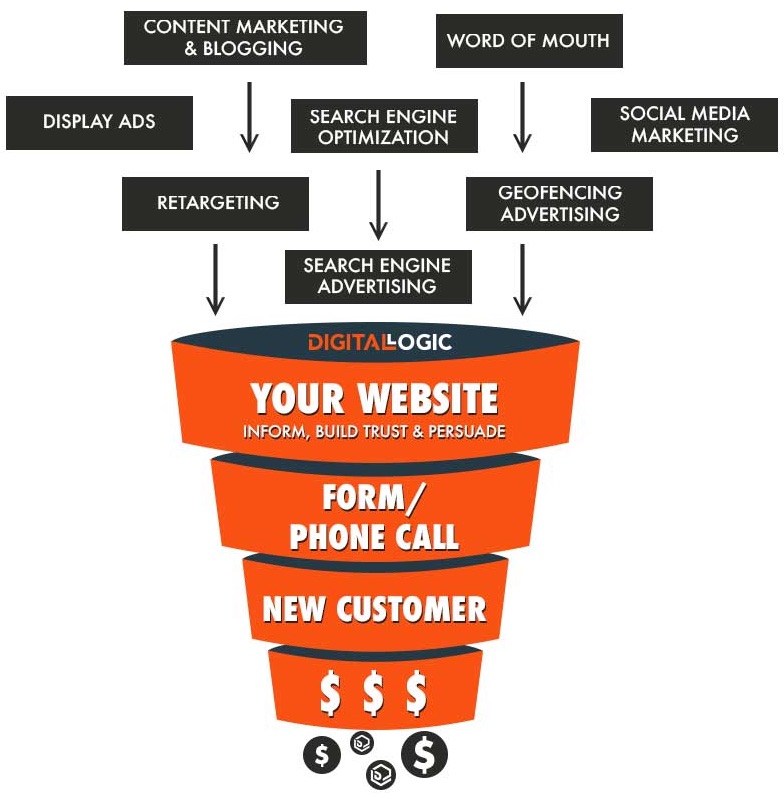
- Quality Law Firm Website Development
- SEO for Attorneys
- Search Engine Advertising for Lawyers
- Display Ads
- Location-Based and Geofencing Advertising
- Content Marketing for Law Firms
- Social Media Marketing for Attorneys
Law Firm Websites That Convert
As a legal professional, we’re sure you understand the importance of standing out online. This includes your legal site. Your potential clients will form their opinions based on how professional or unprofessional your website appears.
Having a quality firm website means much more than simply using attractive graphics with a nice law firm website design. It shows the audience that you know how to communicate with clients, and you care about their experience. Your site will also need to follow all of the necessary lawyer advertising rules.
High-quality website, High-quality lawyer.
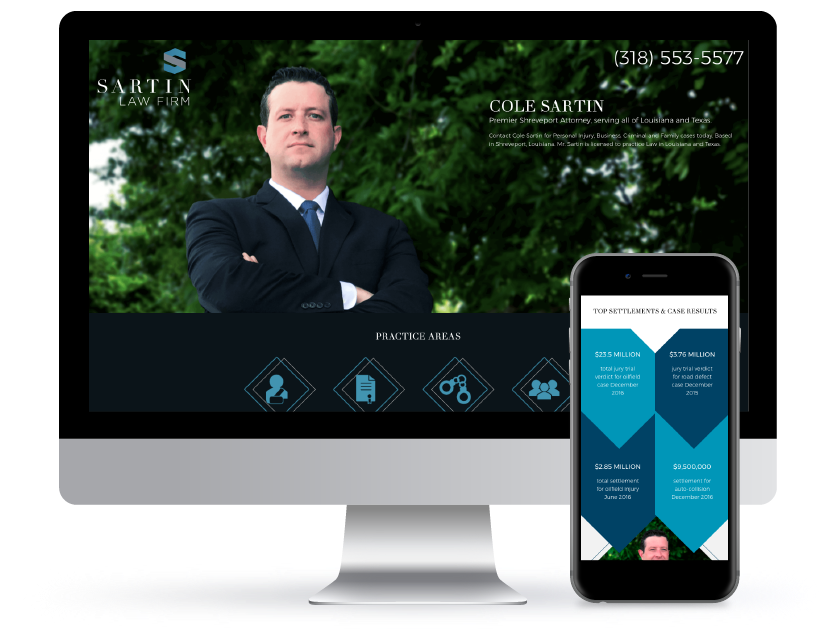
In order to implement these practices, you must first understand what Google considers a high-quality website. Staying within those parameters to build or upgrade your website will give you a better presence online.
How Does Google Rank Legal Websites?
The Google Search Engine uses an algorithm to rank websites in the search engine results page (SERP). Some of the various important parameters include:
- Unique Content– Duplicate content is penalized, even if it comes from the same website or elsewhere.
- Offers Value– A high-quality website successfully answers a searcher’s questions.
- High Quantity of External Links– The number of external editorial links to a website increases its value.
- Quality Links– High-quality pages (both internal and external) link to pages on your site.
- Fast Load Time-Every page loads in three seconds or less.
- Responsive Design– The website is easy to access and displays properly on any type of device.
- Intuitive Navigation– Content is well organized, easy to use, and easy to understand.
- Well-Written Content– Content answers potential clients’ questions. It’s up-to-date, accurate, and easy to digest.
- SEO Optimized Media– Images, videos, etc, are marked with alt tags for SEO purposes.
- Informative CTA’s– Content points to additional helpful resources, including a strong call-to-action.
Following these best practices for web page design not only makes your law firm’s website useful but also increases the potential ranking of the website on Google’s search engine results pages, which is how to get more non-paid web traffic, also called organic traffic.
This is one of the best ways for new lawyers to get new clients.
SEO for Lawyers
Law firm SEO (SEO) is a set of techniques used to boost a website’s ranking on the search engine results page (SERP). SEO helps to generate web traffic from non-paid searches. This also will help your firm more in the long run, even for your paid ads, by improving your quality score.
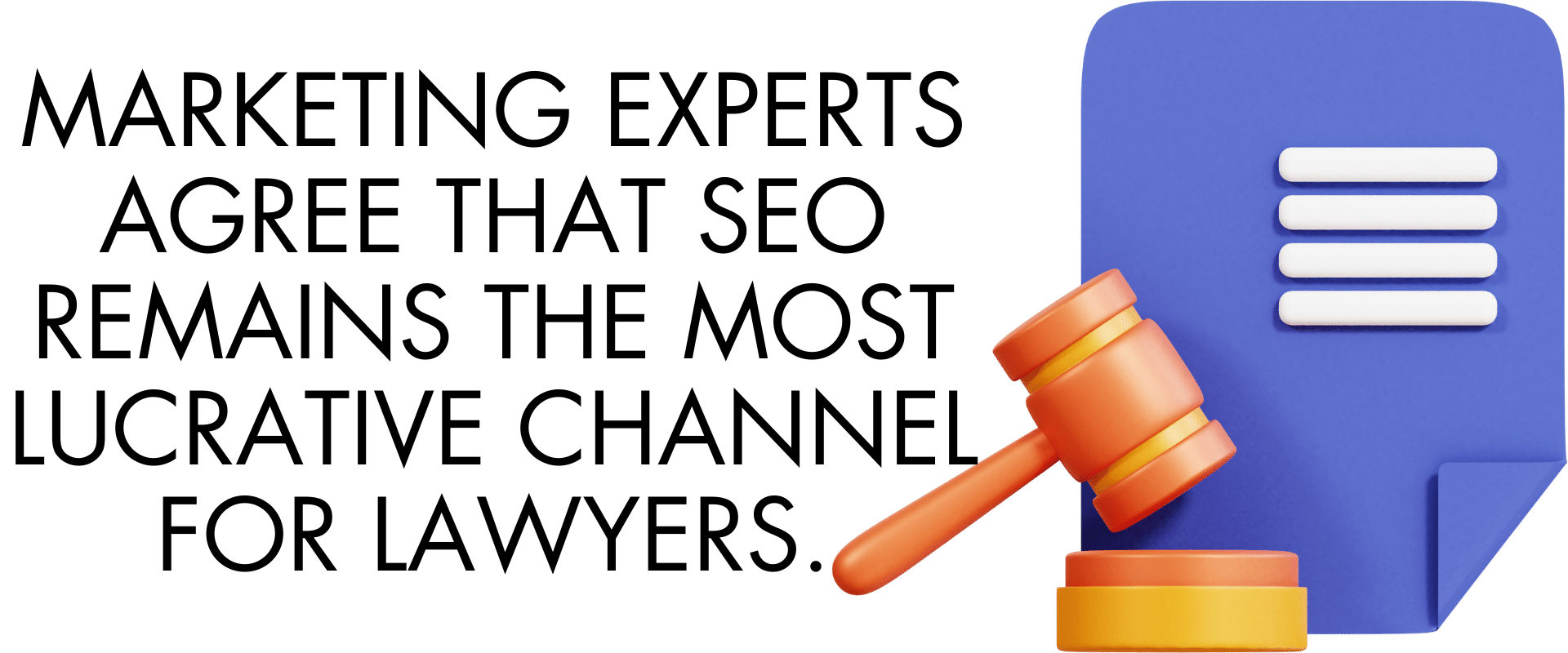
Most attorneys do well by outsourcing SEO work to professionals that are law firm internet marketing specialists. Marketing specialists must continue to stay up to date with the newest search algorithms, as they change frequently. For this reason, law firm marketing strategies and SEO techniques that worked well last year may not work as well this year. This is also another incentive to outsource SEO.
Current SEO Best Practices For Lawyers Include:
- Having easily accessible web pages that the search engine crawler bots can parse and index.
- Registering a text-based sitemap with the search engines and requesting indexing of a website.
- Including important keywords and key phrases, as well as secondary keywords that relate to the searcher’s interests.
- Understand how your clients search for terms and note that trying to rank high on search engines for generic keywords, such as “personal injury attorney,” is not the goal. However, ranking high on the search engine results pages for an attorney keyphrase, along with the name of the local community, is a good goal.
- Strong law firm branding– Use a compelling URL (domain name), web page title, and meta description that will appear as the SERP snippet.
- Add schema markup to instruct search engines on content. Schema markup is not visible to web users but is the descriptive information in the source code about what a web page contains that can be indexed by a search engine.
- Optimize web pages for quick load times and responsive looks.
- Make all web pages secure using secured socket layer (SSL) encryption. This requires registration of the website to get an SSL certificate that needs to be renewed each year.
- Give your site authority. Amplify the website’s importance across the web with authoritative links and mentions on social media.
SEO efforts must be ongoing, in order to be successful and generate more referrals for lawyers, not a one-time effort. Content updates and generating new links are always part of the ongoing process. This is why most law firms outsource this work to SEO specialists that make these efforts on a continual basis for the firm’s website.
Content Marketing and Blogging
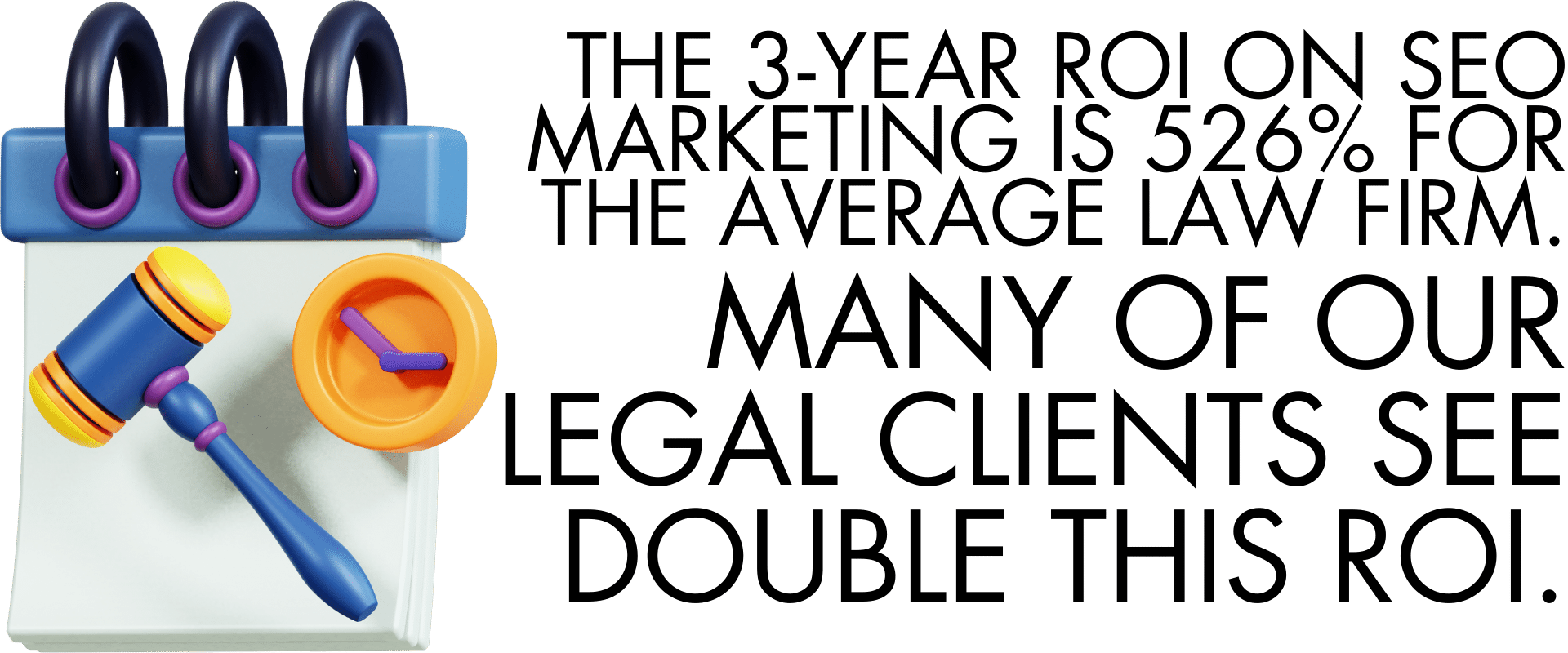
Content marketing for attorneys means creating material that potential clients will find useful. Then, by distributing this content freely, a law firm is able to gain client confidence, with legal services offered by the law firm.
For many law firms, content marketing and blogging generate new client leads on a monthly basis.
How to Create Legal Content
Quality content marketing makes for a good read and helps clients understand general legal concepts. By informing and educating potential clients, a law practice can build up a substantial reputation and constantly attract new clients. Your legal content should be helpful, and informative and naturally end with a call to action to engage the law firm.
Having a blog on your practice site helps to demonstrate expertise in a specific area of law. Dig deep down to your humble beginnings and answer some of the first questions you had, as a student.
In order to find a good starter topic, think about the questions you get from clients and start building a list of those questions. The list of questions will give you a good foundation for blog topics. Then, look at the critical law firm marketing trends for your area.
You’re an expert in your field. Write like one.
The blog post should start with catchy titles that create curiosity and then explain real-life examples of how the cases progressed and what the results were for the cases.
Has your firm recently won a case? We sure hope so. Publicly recorded case results make for great professional blogs.
Include helpful descriptions of general practice ideas that lead to a law firm’s engagement. For example, an estate attorney describes the benefits of having a living trust. This helps generate clients for his legal services.
What if you don’t have time?
You don’t actually have to create the content used for these purposes. Plenty of freelance writers and legal marketing companies write professionally.
Regardless, all legal practices benefit from content marketing.
How to Distribute Legal Content
The distribution model for this useful content depends entirely on your preference and what you believe your audience will respond the best to.
You can distribute data in several ways, including audiobooks, email blasts, and posting content to your blog.
Keep in mind, the content format doesn’t have to remain the same. In fact, sometimes it’s better to switch things up. Include images and info-graphics specific to your industry. If you feel more like talking, record yourself and post a video link.
This doesn’t have to be a difficult, overthought process.
How to Leverage Legal Content
Remarketing campaign services help lawyers leverage their content strategy. Once someone leaves the site, they will continue to receive content similar to what sparked their interest, previously. This happens until they reach out to your law firm through a phone call or form submission.
PPC Advertising for Law Firms
Paid search engine advertising, or PPC for law firms has the potential to be extremely effective.
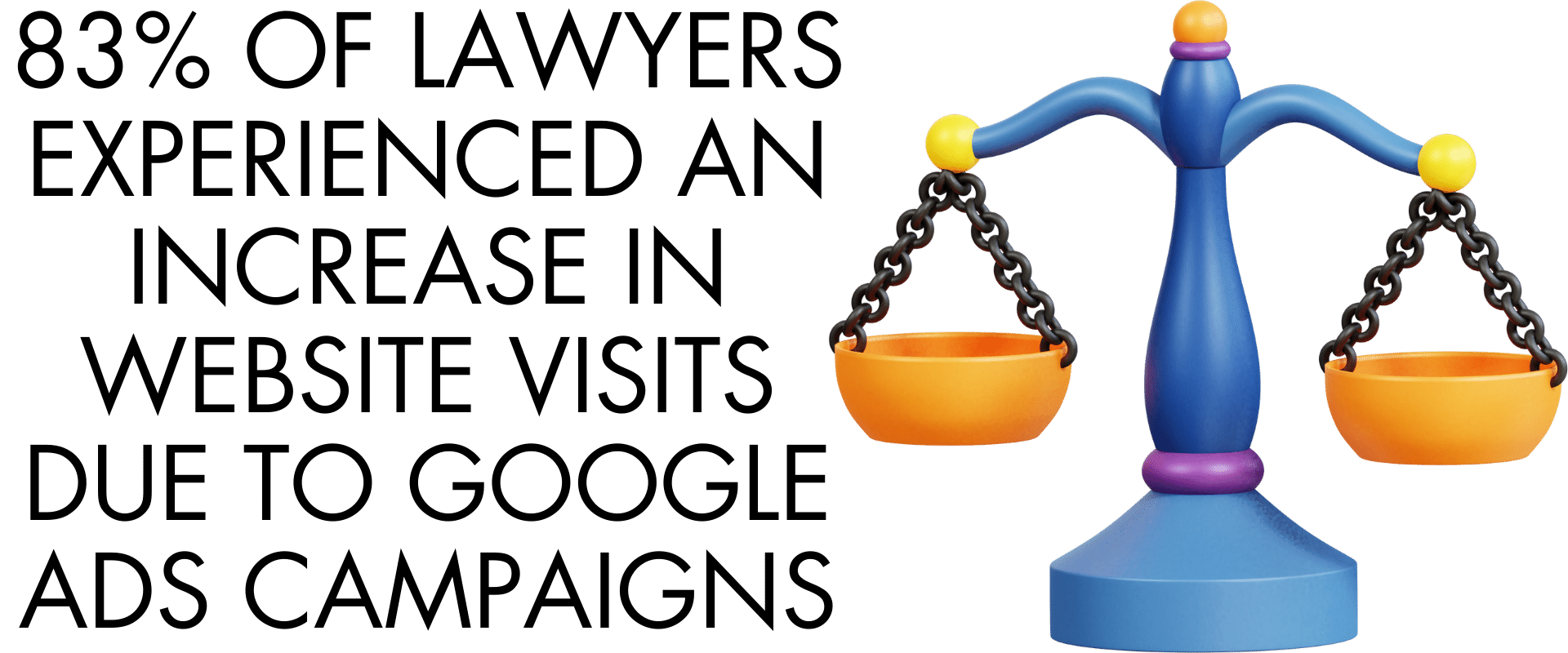
However, one should be prepared to pay the rising click prices associated with keywords that produce valuable leads. Search engine advertising is also often referred to as PPC, because the purchaser literally pays for each click, or Pay Per Click.
With the proper tracking and professional legal PPC management services, you can easily reach a 500%-1000% return on paid search spend.
In order to market yourself, as a lawyer, first, you will need to complete extensive training, as well as retraining each time Google Web Crawler changes its algorithm. The choice to opt out of training results in money wasted on unqualified leads.
Click Prices for Legal Advertising
Google helps advertisers by providing them with the necessary tools to estimate PPC costs and the cost per click (CPC) of ad campaigns. Think of Google Adwords as an auction, selling the advertising web traffic for keywords to the highest bidder.
However, simply bidding the most doesn’t necessarily win the targeted keyword. Adwords also takes into account your Quality Score.
This is also an area in which an experienced marketing professional will be of value.
For extremely valuable search terms, such as “Mesothelioma Attorney TX” for personal injury attorney marketing, law firms bid the price up to over $300 per click in 2014, making this phrase one of the most expensive advertisements on Google Adwords, according to AdGooRoo.
Paying that much for a single click, which may result in nothing valuable for a law firm, is risky. However, some law firms wanted to take the risk because the value of capturing a mesothelioma case was so high in 2014. This price has since come down, yet continues to remain in the range of $100 to $200 per click, depending on the location of the law firm.
Legal advertising budgets have the potential to blow up quickly. Put simply, the legal industry is not a sector that should attempt to DIY paid search advertising.
A paid click is worthless unless it results in a conversion.
A conversion is essentially turning a stranger into a lead. Conversions present valuable actions to a firm, such as a potential client requesting a call or requesting an online quote.
Digital Logic offers conversion rate optimization services to help improve this digital marketing metric.
Legal Advertising Metrics
How do you know if your efforts have been successful? First, you must define your goals. Then track phone calls, forms, and new cases.
You will use your results to determine your cost per-case acquisition cost.
We provide the following dashboard for our clients to track and measure our online marketing for law firms, on their behalf:
Online Display Ads for Attorneys
Small Biz Trends reports the reduced effectiveness of display ads when compared to search ads. Search ads and display ads are more different than one may think:
Search ads are intent-driven, while display ads typically help with branding and brand recall.
The vast majority (63%) of people think banner display ads are annoying, and completely ignore 92% of banner ads. When an experienced advertiser employs a targeting method, the number drops marginally.
A few of these tactics include:
- re-targeting services
- geofencing marketing services
- demographic or interest targeting.
Tracking methods add a “cookie” to a user’s browser that can be interpreted by other websites.
AdWords then presents the advertisements, again, to the same web user, when they visit other websites that are related to the first one. This happens because of the tracker set in place beforehand, that follows them
For stand-alone display ads, the average click-through rate reported by Small Biz Trends is a measly .07%. Re-targeted ads that are shown again to the same user have click-through rates that are ten times higher at .7%.
Another option for lead generation via advertising is native advertising. This type of digital advertising intentionally blends in with the content.
Location-Based Geo-fencing Advertising for Lawyers
This section explains how to implement marketing strategies that target potential clients. This is done by generating leads from a professional website and other methods that increase web traffic.
The most beneficial leads to a firm, usually come from down the street, so to speak. A potential client will be much more willing to drive 15-20 minutes to meet with you, than if you were located hours away. Using SEO efforts that combine a keyword phrase with the name of a local community can generate more local-based law firm leads.
Geofencing for Lawyers
Geofencing makes use of the physical location of the person to present relevant content. CIO.com explains that geofencing is when an application or web-based service makes use of GPS, RFID, WIFI, or data from the cellular system to specifically target persons in a limited geographic area.
Google has made localization a key component of relevant search engine results. Google has an API that allows developers to use geofencing in order to target potential clients in specific geographical areas.
Firms that benefit from having new clients from a specific geographical area should employ a legal marketer who specializes in lead generation, with a geofencing system to improve legal leads.
Local Service Ads for Attorneys
Google Local Service Ads have also recently been made available for attorneys. LSAs for attorneys are Google-approved advertisements for firms that appear as the top result on the page. These ads top both the sponsored and the top-ranking sites.
Read this comprehensive guide on Google Local Service Ads for attorneys.
Social Media Marketing for Attorneys
Social media marketing for attorneys is useful for almost any law practice. Why wouldn’t you want free exposure?
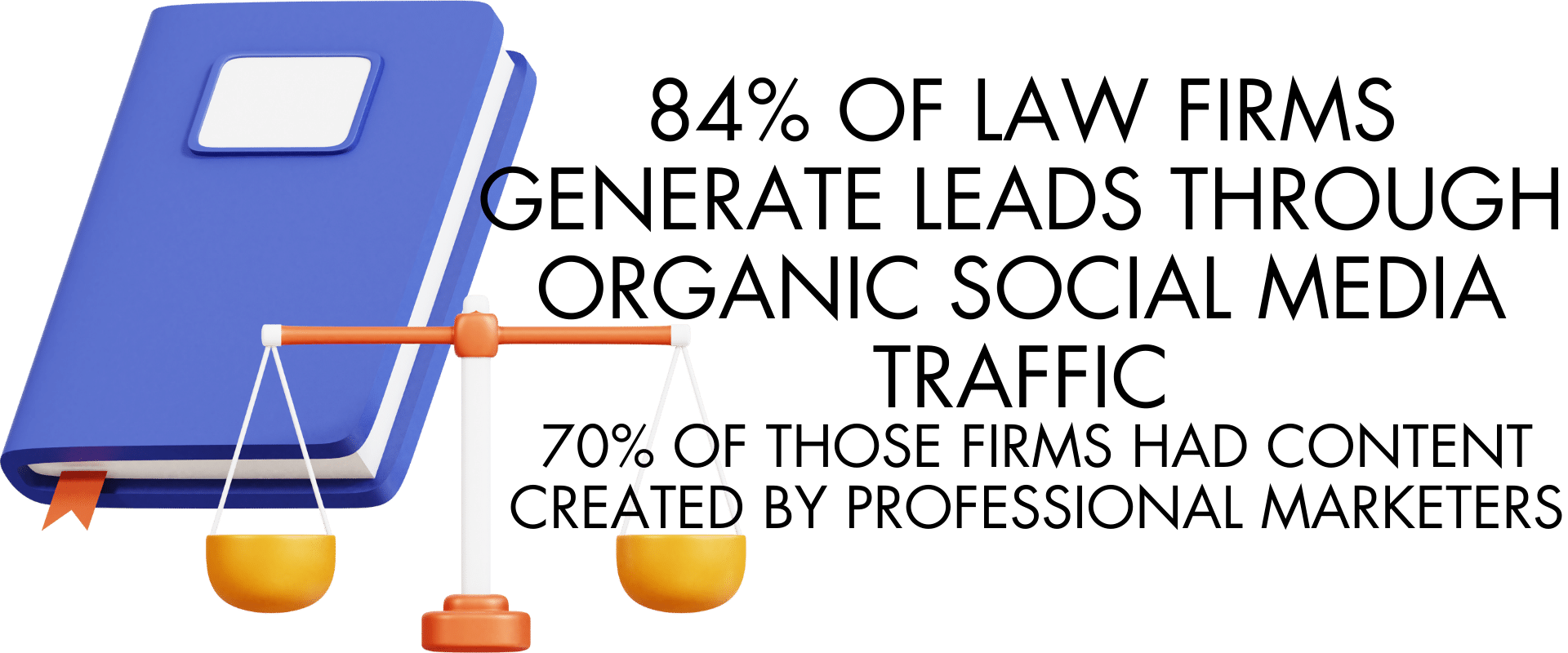
For practices that want lead generation targeted toward consumers, Facebook marketing is the best choice. And, for practices that target more business relationships, LinkedIn may be the better option.
Facebook Marketing for Lawyers
The seven steps to create a successful Facebook marketing campaign are:
- Determine Goals: Before commencing a Facebook campaign, it is important to have a clear set of goals and how to measure success.
- Identify the Target Audience: The target audience needs to be clearly defined. Be very specific about the demographics of who is desirable. There is no point wasting efforts and money to attract people who cannot become a new client.
- Budget Properly: Create a budget that is adequate and that allows enough effort to produce a result.
- Create Engaging Content: Have a stockpile of engaging content created in advance of the need to be able to supply a continuous stream of helpful content. This helps convert the attention generated into more new clients. The average rule of thumb is that it takes at least seven pieces of engaging content to trigger a positive response from most people.
- Create Value: Avoid a sales pitch in the ads. The most effective ads are those that give away the engaging content created in the previous step. Give them something before you get something back.
- Monitor Advertising Results: It is possible and beneficial to monitor advertising results in real time. If an ad is failing after a reasonable test, pull it before it wastes more money.
- Use A/B Testing: To find the most effective ads, test them against each other by A/B testing them. Run two different ads that have the same target audience and see which one performs better. Repeat this process with all ads to find the best ones.
LinkedIn Marketing for Lawyers
For business-to-business (B2B) legal services, such as corporate contract law, LinkedIn should be much more effective, for social media marketing purposes.
The platform holds a reputation as a social media service for generating business leads. LinkedIn readily enables networking with other professionals.
Falcon reports that LinkedIn is responsible for about 64% of the web traffic that comes to corporate websites from social media.
Now, lawyers can take advantage of the newest addition: video advertisements, as an attorney lead generator. As we mentioned earlier, content marketing can be a powerhouse tool for legal lead generation, and using video should be no exception.
A compelling video is useful in creating web traffic to an attorney’s website. The video also reinforces branding, depending on the area of practice.
A perfect example of the correct video marketing implementation is Derek Hawkins, a Trademark Attorney at Hawkins IP.
3rd Party Attorney Lead Generation Services
This section takes a look at the top ten paid lead generation systems for attorneys.
Ten popular attorney lead generation companies (in alphabetical order) include:
Attorney Lead Generation Experts

All attorneys benefit from using lead generation systems that are cost-effective. Many law firms use more than one system effectively. Exercise caution when asked to make a long-term contractual commitment. In general, the systems that do not try to lock up law firms in long-term contracts have higher quality leads that are better priced.
With any advertising and marketing methods used, it is important to track conversion results and determine the acquisition costs to compare this with the value to the law firm for new clients.
Not all lead generation systems work well for all types of legal practices. It is important to test each system that seems appropriate by allowing a sufficient budget and enough time to have a reasonable test. After sufficient testing, it is easier to concentrate funds on the systems that work best for a specific law firm.
If you’re in the process of choosing a law firm marketing agency, consider Digital Logic’s legal marketing services!
Digital Logic is a legal marketing agency that focuses on implementing strategic but simple law firm online marketing strategies for large and solo law firm marketing campaigns. based in Shreveport, LA.
We offer a free competitive analysis for law firms so give us a call today!

